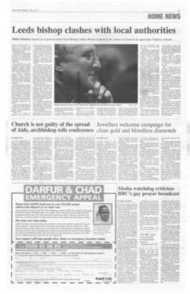Page 5, 4th May 2007
Page 5

Report an error
Noticed an error on this page?If you've noticed an error in this article please click here to report it.
Tags
Share
Related articles
Pope Intervened To Free Sailors Held By Iranians
The Consistory That
U.s. Blamed For Hostages Release Delay
'man Is Sick From The Lack Of Truth'
Holy See Tries To Intervene In Stoning Case
How the Pope freed the hostages in Iran
ritain's embassy to the Holy See played a key role in securing the release of the 15 Royal Navy sailors and marines last month, the Vatican Notebook is able to disclose for the first time.
According to a highly placed government source, the embassy asked Pope Benedict XVI to send a letter to Iran's supreme leader Ayatollah Khamenei asking for the hostages to be freed after all other diplomatic channels had been exhausted. "The United Nations and the European Union were constrained from mediating owing to ongoing differences with Iran over its nuclear programme," the source said on condition of anonymity due to the sensitivity of the issue. "That left a neutral party, such as the Vatican, as the only viable mediator."
The Pope's letter was then passed through the Iranian embassy to the Holy See, who then sent it on to Tehran. "1,lie received the Pope's letter with great happiness,IrAn's Ambassador to the Holy See, Mohammed Javad Faridzadeh, told The Catholic Herald. "We immediately sent it to Iran as we know the spiritual importance the Vatican has throughout the world." Hours later, on April 4, President Alunadinejad freed the captives, saying their release was an Easter "gift" to Britain. The phraseology, the source pointed out. was almost identical to that used in the letter (the Pope asked the Iranian leader to free them as an "Easter gesture of good-will").
Ambassador Francis Campbell said the letter, together with other diplomatic activity going on at the time, "certainly had an impact" on their release. However, he would not be drawn on the embassy's own involvement. "For reasons of diplomacy it might be more difficult for me to go into," he said. "We have to keep certain channels of communications and conclusions confidential."
Yet the British diplomat's key role in securing the sailors' freedom is being seen in Rome as a major diplomatic coup for the embassy which only two years ago seemed on the brink of closure. It also comes at a time when collaboration between the Holy See and Britain has rarely been so extensive, with the two states working closely on tackling poverty and climate change.
The embassy's :effectiveness in this incident is being put down to its efforts to foster good relations with those states which have strained relations with Britain. Ambassador Faridzadeh and his staff have been regular guests at the ambassador's palatial residence near the Quirinale, the seat of Italy's president. The ambassador, a long-haired philosophy professor, is a close friend of former reformist fr-anian President Mohammed IChataini, and is regarded as an easier figure to deal with than his more hardline counterparts in Tehran.
For Ambassador Campbell, this is his most public achievement to date. The 36-year-old former adviser on Europe to Prime Minister Tony Blair has only held the position for 18 months. "It is a splendid diplomatic feat," said one English priest in Rome, adding: "What beckons for him next? Paris. Washington, perhaps even Tehran?"
Last week's Vatican debate on climate change was warmly praised by one of its delegates, climate change sceptic Viscount Monckton of Brenchlley. "I was very impressed." he said. "I congratulated Cardinal Martino that, for the first time in recent memory. there was a climate change conference that did not say, 'Yes, there's a problem', but instead listened to both sides."
Lord Monckton, a mathematician whose own calculations show climate change to be an alarmist myth, said the conference was "evidence of the maturity and carefulness of thought that I have long learned to expect from the Holy See." Not all agreed. however, and some proponents of the science were furious that sceptics such as Monckton and Professor Antonino Zichichi, one of the world's leading physicists, were invited to attend. Still, it guaranteed a hard-headed debate which, at times, even spilled out into the corridors. There was also openness of mind among some delegates. Lord Monckton said he was looking into a couple of issues raised and checking them with scientists all over the world. He argues that although climate change science has the backingof2,000 UN scientists,-thousands of others take a different view.
Environment Secretary David Miliband was given top billing as one of the first speakers, and spoke on the ethical and moral dimension of climate change. But if he expected a softer ride at the Vatican than at Westminster, he was mistaken. One delegate who forgot to turn off her microphone was overheard to say at the end of his speech: "Rubbish!'
Rome Correspondent: Edward Pentin E-mail: [email protected]
blog comments powered by Disqus

















